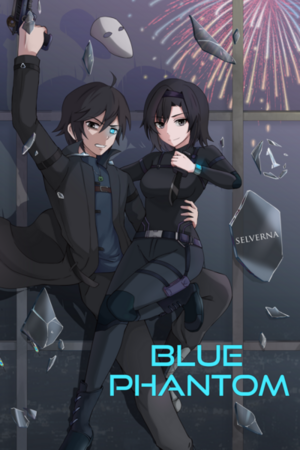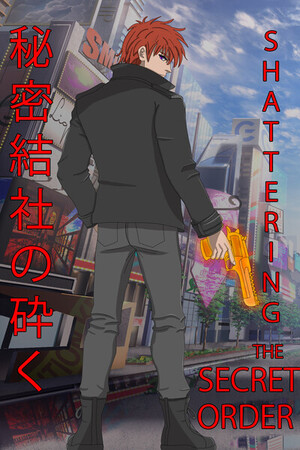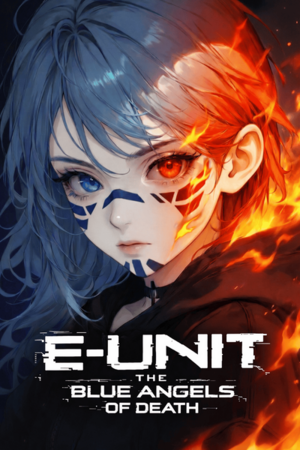Chapter 1:
The Pits
ASA Genesis
My life is lived in refuse.
They called this place the Pits. The Pits was set beneath Kamikoshi City, which loomed overhead like a floating mountain supported by twin arches. Here endless hills of every kind of waste you can imagine came to rest, ferried down with purpose from the city above.
My name is Takuma Mori. I didn’t always live in such filth. I had been born and raised in Kamikoshi’s Mid-City district. I had lived there with my parents as an only child until I turned twenty-three.
That was four years ago.
Four years ago, I was banished to the Pits. It had been the price to pay for a rash decision, one I had quickly come to regret. Since that day, I have spent my time in exile caught up in thought about how powerless I had been, about what fate could have befallen my father and mother. I was a sullen watcher from afar.
The usual loud monotonous noise of my morning alarm jolted me awake. My roommate, Hanzou Ishida, groaned as he rolled over and pulled his blanket up over his head.
After sitting up and wiping the tiredness from my eyes, I then forced myself out of bed to feel my bare feet touch the cool floor. I ran my hands through my long, untidy hair as I yawned. I now eyed the bed adjacent to mine and the lump beneath the blanket that was Hanzou. Smirking, I picked up my pillow and hurled it at him.
“Get up,” I said, trying hard to keep my early-morning moodiness at bay.
“I thought we were friends,” said Hanzou wryly, whose muffled voice was still heavy with drowsiness.
“There’s not going to be any food left,” I said jokingly, now moving to begin dressing into my work uniform, gray coveralls.
In the corner of my eye I saw Hanzou burst from beneath his blanket, his slender frame bolting straight up. “Ready in ten, senpai!” he exclaimed. He then stood to perform a stiff and comical bow.
I groaned. “I told you not to call me that. The fact that I’m your senior doesn’t mean anything here.”
“Oh, but you are special, Takuma,” said Hanzou, patting me hard on the back, his face beaming.
That’s Hanzou, I thought to myself. Sarcastic as always.
When we were both dressed, Hanzou and I gathered at the door. Before leaving, we performed our morning ritual fist bump. Hanzou had insisted that we do this, and while I had been uninterested at first, I had learned to go along with it.
As the door squeaked opened, my eyes were assaulted by the intense light of the scarlet sun which had crested the peak of the tallest pile of waste in view of our shanty. As my eyes adjusted, I saw the long line of Pit Dwellers who had queued up for breakfast. Begrudgingly, I made my way to the back of the line with Hanzou at my side.
“End of the line again,” I sighed, avoiding a large puddle of muddy water as Hanzou casually walked through it.
“Relax, man,” said Hanzou, patting me on the shoulder. “It’s a new day. Besides, we’re guaranteed food. Everyone gets the same portion.”
That’s the issue, I thought. They don’t feed people enough food. Life here is the definition of cruelty.
As the line moved closer to the serving counter, Hanzou and I collected our bowls and chopsticks. At the counter, I held out my bowl into which the server behind the counter placed a paddle-full of steaming rice. A bony piece of fish accompanied the rice, lying unadorned atop the white mound.
The canteen where workers ate sat nearby, a simple tin roof covering the area that consisted of several metal tables with benches. No one was allowed to take their food back to their dwellings. Hanzou and I found our usual spot, sitting on either side of the table.
“Let’s eat,” we said in tandem, and then dug into our food.
I ate every last kernel of rice. While we workers ate, a different server visited each table and handed out glasses of water. When I had finished, only the bones of the fish, which had been more bones than fish, remained.
One of the sector managers now arrived. “Ten minutes to clock-in!” he shouted into a megaphone. “Ten minutes! Do not be late!”
“We better go,” I said to Hanzou.
“Let’s,” he replied.
After placing our bowls, chopsticks, and empty water glasses into the wash tub, Hanzou and I returned to our shanty. Standing abreast, the bright morning light flooding in from behind to cut through the shadow of the dim room, we gazed upon our OMNI units.
Both robots stood in silence at the back of the room, their heads hung. They were humanoid at first glance, but more robot than not. They were Kenji Model-9 units: built and programmed for waste management. A microchip implant called a K-Link connected each worker psionically to their OMNI unit, allowing for each worker to give mental commands and control their OMNI unit. This allowed for greater work efficiency while also reserving the most difficult and dangerous tasks for the OMNI units to complete. The higher-ups were happy to save money this way, but we all knew that without the OMNI units to help us no one who worked in the Pits would last a week.
Hanzou and I always made a game of who could activate their OMNI unit first.
“Ready?” I said, looking at Hanzou in the corner of my eye.
“Ready,” he said, staring intently at his OMNI unit.
“On three,” I said. “One, two... three!”
“Attention OMNI unit 00647!” I commanded.
“Attention OMNI unit 00270!” shouted Hanzou, pointing enthusiastically.
My OMNI unit’s head straightened, the sound of servos whirring, as two eyes like bright rings of bluish-white appeared, contained within the visor on its face. Hanzou’s OMNI unit seemed to be a mere second behind.
“Dammit!” Hanzou cursed, swinging a fist through the air in defeat.
“Close,” I said, smiling. “Better luck next time, bud.”
With the activation of our OMNI units both of us were clocked-in for the day’s work. Running low on time, Hanzou and I made our way back outside with both of our OMNI units in tow. We were to assemble in the common area like normal where each squad would get their assignments.
The day’s heat was already blazing. Standing four abreast, each worker’s OMNI unit standing sentinel behind its partner, we waited for the overseer to arrive.
The overseer’s name was Shota, a short man in his upper fifties, though his crew cut of gray hair and leathery face made him look significantly aged. There was also his infamous temper, which gave cause for most to avoid him if they could.
At eight-thirty, the bell rang. Shota now appeared, stepping from his office building with a limp in his step as always, a soiled rag clutched in his hand to wipe away his sweat, a clipboard in the other. Shota stopped in front of the group of twelve, made twenty-four when factoring in each OMNI unit. A light breeze blustered through, kicking up some dust.
“Squad one!” Shota yelled, looking down at the clipboard.
“Yes!” replied all the members of squad one.
“Start work in quadrant three today.” “Squad two!”
“Yes!”
“Continue in quadrant one, but don’t lay a finger on that gunship you found yesterday.” “Squad three!”
This was mine and Hanzou’s group. “Yes!” we all shouted together. The other two members of our group were two middle-aged guys named Jun and Ryota. Jun was mostly quiet and diligent in his work, whereas Ryota liked to give orders and boss people around. I would usually just ignore Ryota’s tactics, but Hanzou had a history of getting on Ryota’s nerves which would lead me to butt heads with him.
“Help squad two in quadrant one,” were Shota’s orders. “Alright!” he shouted, some sweat dripping from his chin. “Why are you all still standing here? Get to work!”
“So what’s this gunship Shota was talking about?” Hanzou asked as we began the trek to quadrant one.
“Some old military ship from last century I think,” I said. “I don’t really know.”
“Sweet!” said Hanzou, his fists held up in sudden excitement. His OMNI unit mimicked his movements.
“Um, Hanzou,” I said, pointing casually. “You’re doing it again.”
Hanzou looked back at his OMNI unit which quickly lost its stance of triumph. He laughed nervously. “I’ve really got to stay focused when I’m linked up. If Shota sees my OMNI unit acting out I’ll have to redo that training course. That would really suck.”
“Why?” I said, shooting a grin. “Because you barely passed it to begin with?”
“Hey! Not cool, man!” said Hanzou, his fist raised in jest. “It was a scorcher those three days, and Shota is a harsh grader.”
“You probably shouldn’t be calling the overseer by his first name either,” I said.
“Yeah...” said Hanzou, thinking on my words.
The moment we arrived in quadrant one we got to work immediately. Squad two had begun work moving the largest pieces of rusted scrap metal that had entombed the defeated gunship. Our squad’s task was to pile up the metal scrap onto large flatbeds to be taken to the smelter. Our OMNI units worked together to deal with the largest pieces of scrap, while we workers managed the smaller scrap.
We worked for close to three hours before stopping for a short break in which we each drank our fill of water and ate rice balls.
As I sat with Hanzou in the shade of the largest scrap pile, I stared at my rice ball. Eating this always reminded me of simpler times, of the rice balls my mother used to make. My mother had made the best rice balls.
“Are you gonna eat that or just stare at it?” Hanzou asked, having already practically inhaled his own rice ball.
“I’m going to eat it,” I said, trying not to sound testy.
Hanzou stopped to stare at me. “Hey, are you okay?” he asked. Both of our OMNI units stood nearby, covered in dust and dirt as we were, minus the sweat. “Here, have some more water.” Hanzou handed me his bottle.
I took the bottle and drank some. “Thanks,” I said, then handing it back. “And yeah, I’m fine.” I started to eat my rice ball.
The day ended with everyone gathered in the common area where Shota evaluated our performance. Every day he gave some version of the same speech, depending on how pissed off he was. “Some of you,” he would typically shout, spit flying, “don’t seem to understand that you are here to work! If I don’t see some improvement soon, I’ll have you all begging like dogs before I’m through with you! Dismissed! Get out of my sight, you slackers!”
As Hanzou and I settled back into our shanty, we got to work cleaning up our OMNI units. Besides eating and sleeping, this was the only other part of the day that I enjoyed. For as long as I can remember I have been fascinated by robotics, and giving my focus to one at the end of a long and arduous day was simply pleasant. My father, Isamu Mori, had taught me everything I know about robotics. He was a brilliant robotics engineer.
That was why the Kazama Corporation had come for him.
To end the day, we showered in communal showers and then ate more rice and small bowls of miso soup for dinner. By the time we were finished eating the sun had vanished from the pale sky, though still the heat remained.
At long last I fell onto my bed. I yawned loudly and turned over to lie on my back, to stare at the dark ceiling of corrugated steel. Through the ceiling, right above me, was Kamikoshi City, the place that was my home. The place I had to get back to.
I knew I never would.



Please sign in to leave a comment.